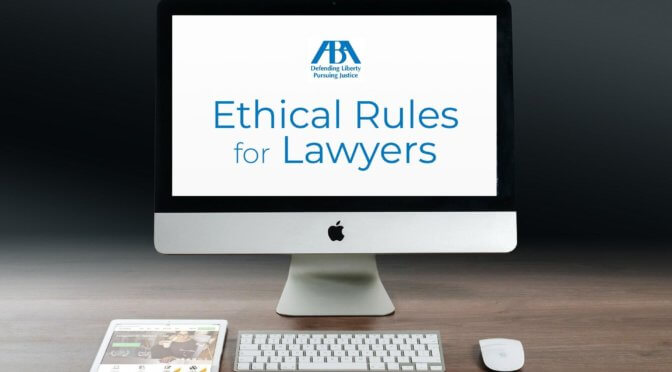Having a website for your law firm is a great way to set your legal services apart from competitors. You can showcase your expertise in a blog, market your services to prospective clients and turn website visitors into new clients.
However, before you make your website live, spend money on advertising, or activate a live chat service, there are ethical rules and regulations every lawyer should follow.
The American Bar Association (ABA) provides clear guidelines for lawyers to follow when it comes to their online activities. This article will cover just a few of the most crucial points and you should review the ABA Model Rules of Professional Conduct for the state you practice law.
Overview of the ABA Rules for Ethics and Online Compliance
As a practicing lawyer, you should be aware that some advertising materials and online content are prohibited. The rules outlined by the ABA vary from state to state and interpretations can be tangible.
The obvious benefits of a law firm website allow distribution of information to the general public, a 24/7 marketing tool, and immediate access for contacting a lawyer.
In contrast, the content being provided can result in website visitors misunderstanding the information or being misled by legal advice. Visitors may use this information to try and answer their personal legal situation.
Another concern when it comes to providing access to legal services online is the safety and security of sensitive information. Email and live chat servers may be saving copies of digital communications which a lawyer can compromise a lawyer’s commitment to confidentiality.
To combat this, lawyers must avoid publishing misleading or inaccurate information. The ABA expects lawyers to provide updated content containing only general information applicable to a lawyer’s area(s) of practice. This also includes links to any blogs or forums which the lawyer makes a contribution.
In regards to confidentiality, there are a few measures a lawyer can take to secure sensitive personal information. Lawyers are in complete control of how their website interacts with visitors. The ABA expects lawyers to consider how they will interact with visitors and discourage the submission of confidentiality. Having a noticeable disclaimer can help.
Overview of Ethical Rules for Law Firm Websites
Lawyers providing access to their legal services or sharing general information about law should follow the following rules to remain compliant.
- Disclaimers are used for a range of ethical concerns that can arise online. From confidentiality to the images of people on your pages (i.e. using actors to portray lawyers, judges or fictitious events), a disclaimer should use warnings or cautionary statements for visitors on a law firm’s website.
- Don’t Make False Client Expectations. Using your lawyer website to convince visitors that you can win their case can be very misleading. You have to be reasonable with your client expectations while convincing clients you are the best choice to hire. If you have factual support and a disclaimer like, “prior results do not guarantee similar outcomes” can prevent a breach of the ABA’s ethical rules.
- Don’t Make False Statements. In rule 7.1(a), the ABA allows lawyers to (1) make statements comparing other legal services; (2) share testimonials from clients or former clients; and, (3) make statements about the character or quality of your legal services. However, as mentioned before, you must provide a disclaimer, provide factual support, and receive permission from clients to share their testimonials.
There are more rules regarding lawyer’s and their websites. Some states may require you to submit your entire site for review or just a few pages.
Overview of Ethical Rules for Advertisements
The first thing you should know about advertising, especially via email, is that you may have to include: “Attorney Advertising.”
The next thing to consider is whether the state you practice law requires a submission of advertising materials. In Pennsylvania and Rhode Island, you are not required to submit websites or other advertising materials. However, other states may have mandatory, optional, or different rules for submission and review.
Another important consideration is where you obtain your advertisements. Lawyers can use a lawyer referral service that has been approved by proper authorities; use written, recorded, or electronic advertisements; and, must provide an address or contact information to the lawyer or staff from the firm responsible for the ad.
Rule 7.2 covers the ethics of advertising in more detail.
Overview of Ethical Rules for Live Chat
Live chat is becoming a popular feature on websites because it allows lawyers or their staff to interact directly with visitors. While each state has their own interpretations of the ethical rules, here is a quick summary:
- Duty of Competence: Lawyers should be cautious when responding to questions outside their area(s) of practice.
- Client Confidentiality: Lawyers must maintain confidentiality to current and former clients.
- Communication with Person Represented by Counsel (Rule 4.2): Lawyers must be careful not to communicate with an opposing party being represented by counsel.
- Unauthorised Practice of Law (Rule 5.5): Lawyers are not permitted to answer legal questions regarding states where the attorney is not authorized to practice law.
- Communication of Lawyers Services (Rule 7.1): Lawyers must ensure not to use false or misleading communication. Some states require a “Disclaimer” when communicating via live chat.
- Solicitation (Rule 7.3): Live chat, depending on how it’s used, may not be used to solicit legal services for prospective clients.
This article is just an overview of the ethical rules and/or interpretations of those rules, it does not cover all possible ethical concerns regarding Website, Advertisements, and Live Chat. For a complete review, go to the ABA’s Model Rules.



